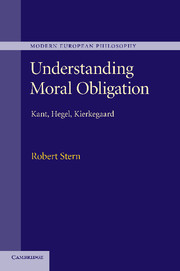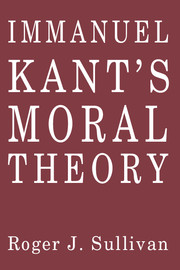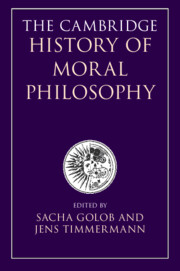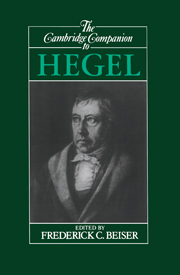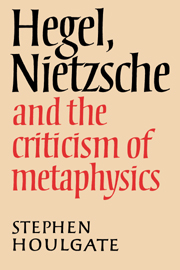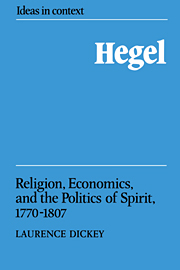Understanding Moral Obligation
Kant, Hegel, Kierkegaard
Part of Modern European Philosophy
- Author: Robert Stern, University of Sheffield
- Date Published: August 2014
- availability: Available
- format: Paperback
- isbn: 9781107434400
Paperback
Other available formats:
Hardback, eBook
Looking for an examination copy?
This title is not currently available for examination. However, if you are interested in the title for your course we can consider offering an examination copy. To register your interest please contact [email protected] providing details of the course you are teaching.
-
In many histories of modern ethics, Kant is supposed to have ushered in an anti-realist or constructivist turn by holding that unless we ourselves 'author' or lay down moral norms and values for ourselves, our autonomy as agents will be threatened. In this book, Robert Stern challenges the cogency of this 'argument from autonomy', and claims that Kant never subscribed to it. Rather, it is not value realism but the apparent obligatoriness of morality that really poses a challenge to our autonomy: how can this be accounted for without taking away our freedom? The debate the book focuses on therefore concerns whether this obligatoriness should be located in ourselves (Kant), in others (Hegel) or in God (Kierkegaard). Stern traces the historical dialectic that drove the development of these respective theories, and clearly and sympathetically considers their merits and disadvantages; he concludes by arguing that the choice between them remains open.
Read more- Shows how Kant's controversial notion of 'self-legislation' has been misunderstood
- Will interest those concerned with the history of modern ethics
- Traces the historical dialectic that drove the development of the respective theories of Kant, Hegel and Kierkegaard
Reviews & endorsements
"… In this thought-provoking book on Kant's ethics and its 19th-century legacy, Stem challenges a prominent interpretation of Kant that makes the autonomy of the moral subject the starting point for his determination of moral value … Stem's account is richly rewarding in its textual commentary, historical contextualizing, and engagement with contemporary scholarship. It will be valuable for students of Kant or 19th-century ethics … Highly recommended …"
D.C. Kolb, ChoiceSee more reviews"… This is a splendidly clear and scholarly account of some central questions of ethics in Kant, Schiller, Hegel and Kierkegaard, showing the related ways in which they are treated by the four thinkers, and why they remain live today … Stern’s book has two foci: (1) the idea of moral obligation as command, by God, self or society, (2) the nature of moral motivation and what makes a person righteous, virtuous or admirable in the highest degree, or what kind of life one is called to. His discussion of how Kant, Schiller, Hegel and Kierkegaard treat these deeply serious ethical themes is the most unaffectedly lucid and thoughtful that I have read for a long time."
John Skorupski, Philosophy Quarterly"This book is a valuable contribution both to our understanding of late modern philosophy and to the contemporary debate about the status of moral obligations. Stern shows how valuable historical understanding can be to a contemporary problem (in this case in metaethics), and at the same time shows how the evaluation of philosophical positions and arguments provides an essential help in interpreting the history of philosophy, in this case the history of ethics among German and German-influenced thinkers of the nineteenth and late eighteenth centuries …"
C. Stephen Evans, Notre Dame Philosophical Reviews"… what a terrific book Stern has given us. In addition to making a major contribution to our understanding of the history of ethics among German and German-influenced theorists of the late-eighteenth to mid-nineteenth centuries, Understanding Moral Obligation sheds valuable light on contemporary debates about the nature and status of moral obligations. Stern has provided a fresh perspective on the philosophical questions motivating Kant’s critical moral philosophy, while challenging one standard story about the relation between Kant and his successors. Anyone interested in understanding how the obligatory nature of moral commands bears on our ideas about autonomy and moral agency would benefit tremendously from reading Stern’s book."
Anne Margaret Baxley, Inquiry: An Interdisciplinary Journal of Philosophy"We should be very grateful to Robert Stern for providing a lucid account of three difficult philosophers in Understanding Moral Obligation. He not only gives novel interpretations of each thinker, but also weaves their thoughts together to stage a dialogue about crucial metaethical issues. Reading Stern’s book has forced me to rethink Hegel’s treatment of duty and value, to clarify my own positions and to reconsider the interpretive options. I would like to thank Stern in particular for producing such an excellent work at the juncture of historical research and systematic philosophy. We learn not only about an important historical episode, but also to think more deeply about contemporary ethical debates …"
Dean Moyar, Inquiry: An Interdisciplinary Journal of Philosophy"… In Understanding Moral Obligation, Robert Stern presents an interesting account of the history of ethics from Kant through Hegel and Kierkegaard … Stern’s story is thought-provoking, challenging, and full of interesting, detailed argumentation and interpretation … illuminating and compelling …"
William Bristow, Inquiry: An Interdisciplinary Journal of Philosophy"In his thoroughly researched and tightly argued new book, Robert Stern proposes that the 'standard story' of Kant as an ethical constructivist - in particular, the idea that Kant rejected value realism as a threat to autonomy - is seriously misleading … Stern’s book is a model of how systematic philosophy can be fruitfully pursued in dialogue with historical sources without doing violence to the historical particularity of those sources."
Philosophy in ReviewCustomer reviews
Not yet reviewed
Be the first to review
Review was not posted due to profanity
×Product details
- Date Published: August 2014
- format: Paperback
- isbn: 9781107434400
- length: 292 pages
- dimensions: 229 x 152 x 15 mm
- weight: 0.4kg
- availability: Available
Table of Contents
Acknowledgements
References and abbreviations
Introduction
Part I. Kant:
1. Kant, moral realism, and the argument from autonomy
2. The argument from autonomy and the problem of moral obligation
3. Kant's solution to the problem of moral obligation
Part II. Hegel:
4. Hegel's critique of Kant (via Schiller)
5. Hegel's solution to the problem of moral obligation
Part III. Kierkegaard:
6. Kierkegaard's critique of Hegel
7. Kierkegaard's solution to the problem of moral obligation
Conclusion: from Kant to Kierkegaard - and back again?
Bibliography.
Sorry, this resource is locked
Please register or sign in to request access. If you are having problems accessing these resources please email [email protected]
Register Sign in» Proceed
You are now leaving the Cambridge University Press website. Your eBook purchase and download will be completed by our partner www.ebooks.com. Please see the permission section of the www.ebooks.com catalogue page for details of the print & copy limits on our eBooks.
Continue ×Are you sure you want to delete your account?
This cannot be undone.
Thank you for your feedback which will help us improve our service.
If you requested a response, we will make sure to get back to you shortly.
×
